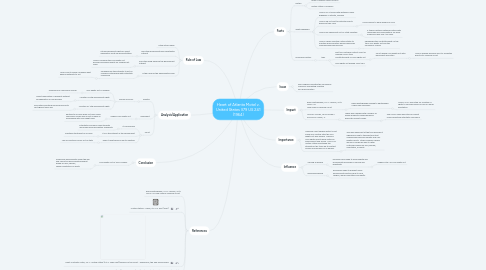
1. Rule of Law
1.1. Is the action lawful
1.2. does the government have substantial interest
1.2.1. 5th ammendment rights of unjust deprivation must be demonstrtated
1.3. Does the ruling advance the government interest
1.3.1. HOAM following the Civil Rights Act provides increased liberty on a significant scale
1.4. is the ruling of the appropriate scope
1.4.1. Congress has the authority to act on concerns interfereing with interstate commerce
1.4.1.1. HOAM has to prove Congress went beyond authority to act
2. Analysis/Application
2.1. Plaintiff
2.1.1. Burden of proof
2.1.1.1. Civil Rights Act is unlawful
2.1.1.1.1. Overreach of Commerce Clause
2.1.1.2. Violation of 5th amendment rights
2.1.1.2.1. Unjust deprivation of property without compensation or due process
2.1.1.3. Violation of 13th amendment rights
2.1.1.3.1. involuntary servitude by being forced to rent against one's will
2.2. Defendant
2.2.1. Uphold Civil Rights Act
2.2.1.1. Renting to all races does not over-reach commerce clause and in fact is lawful in accordance with Civil Right Laws
2.3. Court
2.3.1. it is overreach
2.3.1.1. interstate commerce affected with decreased accommodation availability
2.3.2. it is in the interest of the government
2.3.2.1. Equitable treatment of all races
2.3.3. does it meet goals of law to maintain
2.3.3.1. 75% of clientele is from out of state
3. Conclusion
3.1. Civil Rights Act of 1964 is lawful
3.1.1. Americans have equality under the law and cannot be discriminated against based on race, gender, sexual-orientation or ability
4. References
4.1. Elane Photography, LLC v. Willock, 2013 NMSC 40 New Mexico Supreme Court
4.2. United States v. Lopez, 514 U.S. 549 (1995).
4.3. Heart of Atlanta Motel, Inc. v. United States (231 F. Supp. 393)/Opinion of the Court - Wikisource, the free online library
4.4. https://en.wikipedia.org/wiki/Heart_of_Atlanta_Motel,_Inc._v._United_States
5. Facts
5.1. Parties
5.1.1. Heart of Atlanta Motel (HOAM)
5.1.2. United States of America
5.2. What happened
5.2.1. HOAM is a 216 bed hotel between major highways in Atlanta, Georgia
5.2.2. HOAM did not rent to potential clients based on their race.
5.2.2.1. HOAM policy to deny people of color
5.2.3. HOAM has significant out-of-state clientele
5.2.3.1. A typical distance between hotels with reasonable accommodations for black Americans was over 140 miles
5.2.4. HOAM owner sued the United States to maintain discriminatory policies which he claimed enhanced his sales.
5.2.4.1. Challenged the constitutionality of the 1964 Civil Rights Act and the Commerce Clause
5.3. Procedural history
5.3.1. 1964
5.3.1.1. First trial Northern District Court of Georgia HOAM tries constitutionality of Civil Rights Act
5.3.1.1.1. Court upheld Civil Rights Act with permanent injunction
5.3.1.2. Civil Rights Act passed June 1964
6. Issue
6.1. Did Congress overstep the Commerce Clause by mandating clientele non-discrimination
7. Impact
7.1. Elane Photography, LLC v. Willock, 2013 NMSC 40 New Mexico Supreme Court
7.1.1. Elane photography refused to photograph a same sex ceremony.
7.1.1.1. HOAM vs US was cited for violation of rights to services based on race or sexual orientation
7.2. UNITED STATES, PETITIONER v. ALFONSO LOPEZ, Jr.
7.2.1. Lopez was charged with a firearm on school property. having weapons promotes violent crimes.
7.2.1.1. The HOAM case was cited for violent crimes affecting interstate commerce.
8. Importance
8.1. Supreme Court upheld district court ruling only months after the Civil Rights Act was passed. Previous Civil Rights efforts were limited in enforcement and scope. HOAM vs. United States maintained the strength of the 1964 law to protect access and fairness for all people.
8.1.1. This was significant at the time because it signaled an end to the practices that undermined previous equality and Civil Rights Efforts. Other business owners would no longer be able to deter customers based on race, gender, orientation, or ability
9. Influence
9.1. Serving all people
9.1.1. provisions are made to accomodate and encorporate all people in service and hospitality
9.1.1.1. Upheld Title II of Civil Rights Act
9.2. employing people
9.2.1. provisions made to prevent unfair employment practices due to race, religion, sexual orientation and ability

